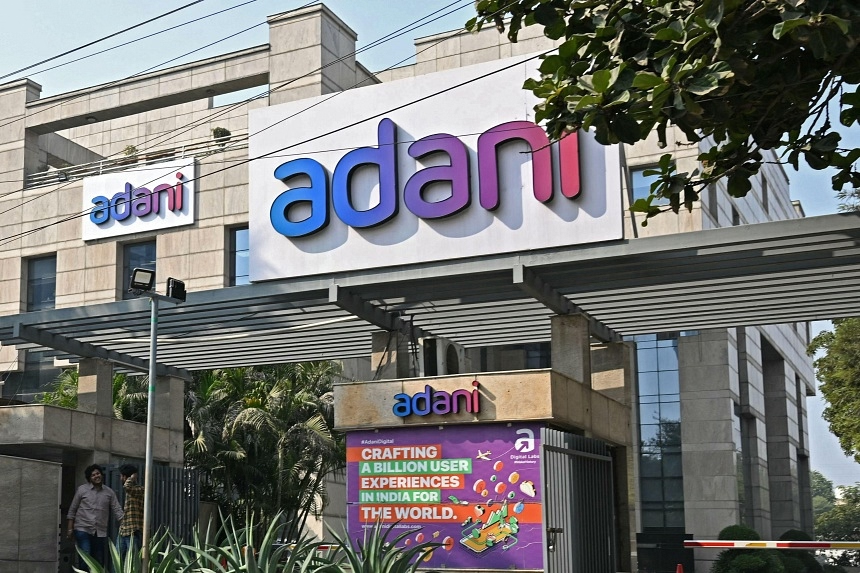By Arunima Banerji #adani #adani news #Japanese Banks #Latest news #news #the firstcritic #top news #trending news

Japanese banks are increasingly strengthening their financial commitment to the Adani Group, even as Western institutions like Jefferies and Barclays reconsider their involvement. This decision by Japan’s leading financial players, including Mitsubishi UFJ Financial Group (MUFG), Sumitomo Mitsui Banking Corporation (SMBC), and Mizuho Financial Group, comes at a time when the Adani conglomerate faces global scrutiny following allegations of stock manipulation and governance lapses raised by Hindenburg Research earlier this year.
Despite the challenges and negative press, Japanese lenders are reportedly extending loans and credit facilities to support Adani’s infrastructure and green energy projects. This backing highlights their confidence in the group’s long-term vision and growth potential. For Japanese banks, the decision appears to be driven by a focus on strategic opportunities in emerging markets and sectors like renewable energy, which align with global sustainability goals.
In contrast, Western financial institutions, including Jefferies and Barclays, have adopted a more cautious approach, likely influenced by heightened regulatory pressures and concerns over reputational risks. Their reevaluation of ties with Adani underscores the divergence in risk assessment strategies between Asian and Western lenders.
Adani Group’s leadership has sought to rebuild trust through international roadshows, emphasizing the company’s commitment to transparency and its diversified growth strategy. The Japanese financial sector’s continued partnership could act as a stabilizing force for the conglomerate, allowing it to address immediate financial challenges, including debt refinancing, and pursue ambitious renewable energy goals.
Ultimately, this divergence in support underscores a broader difference in how global financial institutions weigh risk versus opportunity, with Japanese banks taking a calculated bet on the resilience and long-term potential of one of India’s largest conglomerates.
Contrasting Financial Strategies Across Regions
The Japanese banks’ decision to support Adani stands in sharp contrast to the cautious approach taken by some Western financial institutions. Jefferies and Barclays are reportedly reviewing their engagement with Adani amidst heightened regulatory and investor focus on environmental, social, and governance (ESG) compliance. This divergence reflects a broader trend in global banking, where Asian institutions often prioritize long-term growth potential, while Western banks remain wary of reputational risks.
Japanese banks are betting on Adani’s ability to contribute to India’s massive infrastructure push and renewable energy transition. Their financial involvement has come in the form of loans aimed at both refinancing Adani’s debts and supporting its ambitious green energy projects. In doing so, Japanese lenders are deepening ties with one of India’s largest conglomerates while bolstering their strategic focus on emerging markets.
Adani’s Financial Resilience and Future Prospects
Adani’s diversified business strategy is pivotal to securing investor and lender confidence. The group has expanded into green energy, cement production, and FMCG while maintaining its infrastructure and port operations. This diversification has allowed Adani to weather controversies and reduce the risks associated with a single-sector focus.
However, challenges remain. The group faces the need to refinance over $4 billion in bonds maturing by FY24-FY26. Securing long-term financing, as seen through Japanese banks’ commitments, will be essential to addressing these obligations while ensuring liquidity for ongoing projects.
Additionally, the group’s plans to raise $800 million for renewable energy projects signal a push toward sustainability, aligning with global climate goals. These efforts are intended to enhance the group’s ESG credentials, which have been under scrutiny since the Hindenburg allegations.
Japan’s Strategic Interest in India
Japan’s financial backing for Adani also aligns with its broader geopolitical and economic goals in the Indo-Pacific region. As Japan strengthens ties with India as a counterweight to China, investments in Indian infrastructure and green energy projects become crucial.
Adani’s role as a major player in India’s development provides Japanese banks with a lucrative opportunity to support long-term projects in a fast-growing economy. This strategic alignment is expected to deepen Japan-India relations, with mutual benefits for infrastructure growth, energy transition, and economic stability.
The Role of ESG and Regulatory Pressures
Western banks’ cautious stance reflects growing global scrutiny around ESG compliance. Institutions like Barclays are increasingly accountable to stakeholders who demand transparency and ethical practices in their investments. This has made them more hesitant to align with entities under intense public and regulatory scrutiny, even if the potential financial rewards are high.
For Adani, these challenges underscore the need to bolster transparency and governance measures to regain trust among Western investors. Hiring global auditors and consultants, as the group has done recently, could be an essential step in addressing these concerns.
Conclusion: A Tale of Two Banking Worlds
The Adani Group’s ability to secure funding from Japanese banks, even as Western lenders reassess their ties, highlights the evolving dynamics of global finance. While the scrutiny from Western institutions poses challenges, the group’s partnerships with Asian banks provide a lifeline for its ambitious projects.
For Adani, navigating these contrasting approaches will be critical. By focusing on governance reforms, operational excellence, and ESG compliance, the conglomerate can potentially regain global investor confidence while leveraging its partnerships with Asian banks to drive its expansion plans.
The contrasting strategies of Japanese and Western financial institutions reflect broader shifts in the global financial landscape, underscoring the importance of balancing growth opportunities with reputational risks. Adani’s journey will likely serve as a case study for navigating these challenges in the years to come.
Expanding Adani’s Strategy Amid Global Dynamics
Adani’s recent developments highlight the group’s adaptability in navigating complex financial and geopolitical environments. Amid intense scrutiny from regulators and global investors, the conglomerate continues to demonstrate resilience through diversification and strategic investments. The group’s green energy ventures, such as its solar and wind energy projects, position it as a key player in India’s clean energy revolution. These projects also align with India’s broader climate goals, such as achieving net-zero emissions by 2070, which helps bolster the company’s credibility despite the allegations surrounding it.

Furthermore, Adani has sought to mitigate its risks by reducing its reliance on international bonds. By seeking long-term loans and partnerships, particularly with Japanese institutions, the group is creating a more sustainable financial model. Analysts suggest that this pivot could insulate the company from short-term market volatility, allowing it to focus on strengthening its operational framework and regulatory compliance efforts.
Japanese Banks’ Growing Role in Emerging Markets
Japanese financial institutions have a long history of investing in high-growth markets across Asia. Their interest in Adani highlights their strategic focus on India’s expanding infrastructure and renewable energy sectors. Unlike Western banks, which are increasingly scrutinized by stakeholders for environmental, social, and governance (ESG) compliance, Japanese banks often prioritize long-term growth over short-term reputational risks.
India’s ambitious infrastructure projects, such as highways, ports, and renewable energy installations, present significant opportunities for Japanese financiers. By supporting Adani, these banks gain access to one of India’s largest infrastructure conglomerates, which could serve as a gateway for further investments in the region. This partnership is mutually beneficial: Adani secures crucial funding, while Japanese banks tap into India’s high-growth sectors with considerable potential for returns.
Global Investor Sentiment
Investor sentiment surrounding Adani remains a critical factor as the group seeks to stabilize its financial position. While many institutional investors remain cautious, others see the group’s commitment to transparency and innovation as a positive sign. The Adani Group’s decision to hire global consulting firms to audit its governance practices reflects its efforts to rebuild trust. Additionally, its focus on projects with strong environmental and societal impacts is gradually shifting perceptions in its favor.
Market analysts have noted that Adani’s diversification strategy, particularly its foray into FMCG and cement, helps mitigate sectoral risks. By spreading its investments across industries, the group is less vulnerable to market-specific downturns, ensuring a steady revenue stream. This multifaceted approach demonstrates the group’s long-term vision to remain a dominant force in India’s economy while addressing global investors’ concerns.
Regional Dynamics and Geopolitical Implications
The Adani Group’s expansion also ties into the broader geopolitical dynamics in Asia. India’s infrastructure growth is central to its aspirations of becoming a $5 trillion economy, and companies like Adani play a crucial role in achieving this milestone. Japanese banks’ support aligns with their government’s broader strategic interest in deepening ties with India as a counterbalance to China’s influence in the region.
On the other hand, Western banks, operating in stricter regulatory environments, are under increased pressure to avoid associations with controversies. This divergence highlights a broader shift in global financial markets, where Asian lenders are becoming more prominent in financing major projects in emerging economies like India.
Read More :
The Future of Adani Group’s Financial Strategy
Looking ahead, Adani’s financial strategy will likely focus on balancing domestic and international partnerships. The group is expected to continue leveraging India’s growing demand for infrastructure and clean energy, while gradually addressing governance concerns to win back skeptical investors. By maintaining a proactive approach to transparency and diversifying its financial portfolio, Adani could strengthen its market position and emerge as a more resilient entity in the years to come.
The ongoing scrutiny of the group also serves as a reminder for Indian conglomerates to prioritize governance and accountability in an increasingly interconnected financial landscape. If Adani can successfully navigate these challenges, it could set a precedent for other Indian companies seeking to attract global investment while maintaining robust operational standards.












More Stories
Maha Kumbh 2025 : Unique confluence of faith and technology
Google Tests AI-Driven Audio Feature for Personalized News Summaries
India Digital Summit 2025 – Largest Congregation of Digital Ecosystem